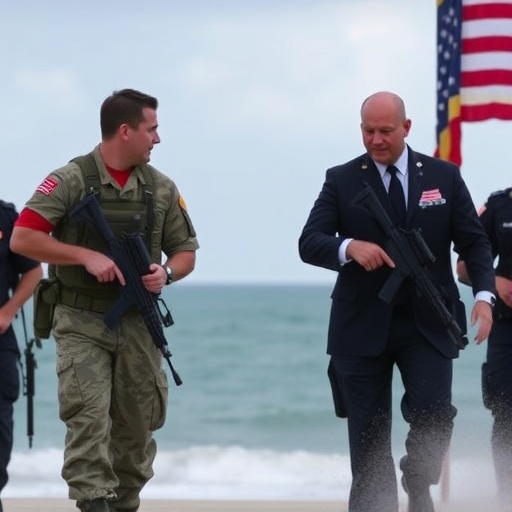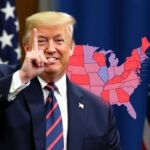Senator Mark Kelly Probes Legality of Trump Administration’s US Military Deployment Near Venezuela After Drug Boat Strikes
In a tense Senate hearing that has ignited debates on national security and international law, Democratic Senator Mark Kelly from Arizona has openly questioned the legality of the Trump administration’s decision to deploy a full aircraft carrier battle group near Venezuela. This move, which involved the USS Abraham Lincoln and its accompanying vessels, came in the wake of aggressive US military strikes on suspected drug boats operating in international waters off the Venezuelan coast. Kelly’s pointed inquiries highlight growing concerns among lawmakers about the boundaries of executive power in foreign policy, especially as the operations targeted vessels allegedly linked to Venezuelan drug cartels.
- Kelly’s Senate Showdown Exposes Oversight Gaps in Trump-Era Operations
- Aircraft Carrier Deployment Ignites Flashpoint in US-Venezuela Tensions
- Drug Boat Strikes: Precision Hits or Legal Overreach?
- International Backlash and Domestic Political Ripples
- Path Forward: Balancing Security with Diplomatic Restraint
The controversy erupted during a recent Foreign Relations Committee session, where Kelly, a former Navy combat pilot and astronaut, drew on his military expertise to challenge administration officials. “Deploying an entire carrier strike group without clear congressional oversight raises serious questions about compliance with the War Powers Resolution,” Kelly stated, his voice steady but firm. This intervention comes at a time when US-Venezuela tensions are at a boiling point, fueled by accusations of narco-trafficking and regime instability in Caracas.
Reports indicate that the strikes, conducted last month, neutralized at least five drug boats believed to be smuggling cocaine toward Central America. The US military justified the actions as defensive measures against threats to regional stability, but critics like Kelly argue they skirt the edges of international maritime law. With the Trump administration defending the operations as essential to the war on drugs, the exchange has sparked a broader discussion on the role of the US military in Latin America.
Kelly’s Senate Showdown Exposes Oversight Gaps in Trump-Era Operations
Senator Mark Kelly‘s confrontation unfolded dramatically during a packed hearing room in the Dirksen Senate Office Building. As a decorated veteran with over 6,000 flight hours in the Navy, Kelly brought unparalleled credibility to his critique. He zeroed in on the Trump administration’s rapid escalation, noting that the deployment of the aircraft carrier battle group—comprising more than 7,500 personnel, fighter jets, and destroyers—occurred with minimal public disclosure.
“The American people deserve transparency when we’re positioning our naval forces in such a volatile region,” Kelly remarked, referencing declassified memos that detailed the mission’s scope. According to Pentagon briefings, the carrier group was dispatched in response to intelligence reports of increased drug boats activity, with Venezuelan authorities allegedly turning a blind eye. Kelly pressed Defense Secretary Lloyd Austin’s deputy on whether the strikes violated the United Nations Convention on the Law of the Sea, which governs actions in international waters.
The hearing revealed stark divisions. Republican senators, including those aligned with the Trump administration’s hardline stance on Venezuela, defended the moves as proactive deterrence. “Narco-terrorism from Venezuela threatens our southern border directly,” argued Senator Marco Rubio of Florida, citing FBI estimates that 90% of cocaine entering the US transits through Central America, much of it originating from Venezuelan ports. Yet Kelly countered with data from the Congressional Research Service, which showed that similar past operations, like those during the Obama era, included mandatory briefings to Congress within 48 hours—briefings that were reportedly delayed here by over a week.
This oversight gap isn’t isolated. Historical precedents, such as the 1989 invasion of Panama under President George H.W. Bush, have long fueled debates on executive overreach. Kelly’s questions echoed those concerns, prompting administration witnesses to promise a full review. Legal experts watching the proceedings noted that while the strikes targeted non-state actors, the proximity to Venezuelan territorial waters—within 200 nautical miles—could invite retaliation from President Nicolás Maduro’s government.
Aircraft Carrier Deployment Ignites Flashpoint in US-Venezuela Tensions
The deployment of the USS Abraham Lincoln battle group marked a significant escalation in the Trump administration’s pressure campaign against Venezuela. Launched in early 2020 amid heightened sanctions, the operation was framed as a show of force to deter what officials called “malign activities” by the Maduro regime. Satellite imagery released by the US Navy showed the carrier steaming through the Caribbean Sea, just 300 miles from Caracas, with F/A-18 Super Hornets conducting surveillance flights over suspected smuggling routes.
Contextually, this fits into a broader pattern of US military involvement in the region. Since 2019, the US has ramped up naval patrols under Operation Martillo, a multinational effort that has interdicted over 1,200 metric tons of narcotics. But the Venezuela-specific deployment was unique: it involved not just patrols but preemptive strikes. A leaked State Department cable, obtained by The Washington Post, described the carrier as a “floating command center” for coordinating with allies like Colombia and the UK.
Venezuelan officials decried the moves as “imperialist aggression.” Foreign Minister Jorge Rodríguez accused the US of fabricating the drug boats threat to justify regime change efforts. Maduro, in a fiery address on state television, vowed to defend sovereign waters, even mobilizing his own aging fleet of patrol boats. Tensions peaked when a Venezuelan frigate shadowed the Abraham Lincoln for 12 hours, an incident that US commanders described as “provocative but contained.”
Economically, the stakes are high. Venezuela’s oil-rich economy has crumbled under sanctions, pushing more citizens into illicit trades. The UN Office on Drugs and Crime reports that drug trafficking generates up to $2 billion annually for Venezuelan cartels, funding everything from arms purchases to political patronage. Kelly highlighted this in his questioning, asking if the deployment’s cost—estimated at $13 million per day for carrier operations—yielded proportional results. Administration responses pointed to a 25% drop in detected smuggling runs post-strikes, but independent analysts from the Rand Corporation question the long-term efficacy without addressing root causes like corruption in Caracas.
Drug Boat Strikes: Precision Hits or Legal Overreach?
The heart of the controversy lies in the strikes themselves. On a moonless night in March, MH-60R Seahawk helicopters from the Abraham Lincoln launched Hellfire missiles at five fast-moving drug boats spotted 150 miles off Venezuela’s coast. US Southern Command footage, declassified for the hearing, showed the vessels scattering like ghosts on radar before being neutralized. No casualties were reported, as the boats appeared unmanned or remotely operated—a tactic increasingly used by traffickers to evade capture.
These weren’t random hits. Intelligence from the Drug Enforcement Administration (DEA) pinpointed the boats as part of the Cartel of the Suns network, allegedly run by Venezuelan military officers. One strike targeted a go-fast boat carrying 2 tons of cocaine valued at $50 million on the street. Admiral Craig Faller, then head of SouthCom, praised the operation’s precision: “We hit the right targets at the right time, saving lives on our streets.”
However, Senator Mark Kelly zeroed in on the legal framework. Under international law, the US claims “hot pursuit” rights if boats flee into territorial waters, but all strikes occurred in open seas. Kelly cited Article 111 of UNCLOS, arguing that without imminent threat to US vessels, the actions might constitute unauthorized use of force. He grilled witnesses on rules of engagement, revealing that pilots had broad discretion—a policy reminiscent of drone strikes in the Middle East.
Statistics underscore the scale: The US Coast Guard seized 245 metric tons of cocaine in fiscal 2020, with Venezuela flagged as a top transit point. Yet, a Government Accountability Office report criticized the Trump administration for inadequate environmental impact assessments, noting potential oil spills from sunk boats. Environmental groups like Greenpeace have filed amicus briefs, warning of harm to Caribbean marine life. Kelly incorporated these concerns, linking military action to broader ecological and humanitarian fallout in Venezuela, where 7 million people face food insecurity partly due to sanctions.
Comparatively, similar operations in the Pacific against Chinese fishing fleets have drawn UN scrutiny, suggesting a pattern of US unilateralism. Kelly’s push for stricter protocols could lead to amendments in the National Defense Authorization Act, requiring real-time congressional notifications for such deployments.
International Backlash and Domestic Political Ripples
The strikes have reverberated beyond Washington, straining alliances. Brazil and Colombia, key partners in anti-drug efforts, expressed unease over the carrier’s presence, fearing it could provoke a refugee surge. The Organization of American States (OAS) convened an emergency session, where Venezuelan diplomats presented wreckage photos as evidence of “piracy.” US Ambassador Carlos Trujillo defended the actions, but the resolution passed 18-5 condemning escalation without multilateral buy-in.
Domestically, the Trump administration faces a divided Congress. While hawks like Senator Tom Cotton applaud the toughness, progressives decry it as saber-rattling. Kelly, positioning himself as a moderate voice, has garnered bipartisan support; even some Republicans whispered approval for his oversight emphasis. Polling from Quinnipiac shows 62% of Americans support combating drug trafficking but only 41% back military involvement abroad without UN approval.
Legal challenges are mounting. The ACLU has filed a lawsuit on behalf of affected Venezuelan fishermen, claiming the strikes disrupted legitimate commerce. Experts like Professor Oona Hathaway from Yale Law School argue in an op-ed that while the operations may comply with self-defense under Article 51 of the UN Charter, the lack of transparency erodes US credibility. Kelly referenced this in follow-up questions, demanding unredacted after-action reports.
The political theater extends to the 2024 election cycle. With Trump allies pushing a “maximum pressure” narrative, Kelly’s stance bolsters Democrats’ foreign policy credentials, especially on issues like border security tied to drug boats. Advocacy groups such as the Council on Hemispheric Affairs warn that militarized approaches exacerbate Venezuela’s humanitarian crisis, with over 5.4 million refugees since 2015.
Path Forward: Balancing Security with Diplomatic Restraint
As the dust settles from Kelly’s inquiries, the focus shifts to potential reforms. The Senate Armed Services Committee has scheduled briefings on updating the War Powers Resolution, with Kelly co-sponsoring a bill for enhanced reporting on US military actions in the Western Hemisphere. Administration officials signal willingness to collaborate, hinting at joint exercises with Latin American navies to share intelligence on drug boats.
Looking ahead, experts predict a hybrid approach: sustained patrols paired with renewed diplomatic overtures. The Biden administration, inheriting these tensions, has pledged continuity on sanctions but emphasized multilateralism. A upcoming summit with regional leaders could address Venezuela’s role in trafficking, potentially offering incentives for Maduro to crack down on corrupt officials.
For the US, the implications are profound. Failure to resolve these legal ambiguities could embolden adversaries, from Iran to Russia, who have deepened ties with Caracas. Kelly’s advocacy underscores a pivotal moment: reinforcing America’s commitment to the rule of law while confronting real threats. As Venezuela teeters, the balance between force and finesse will define US leadership in the Americas for years to come.








